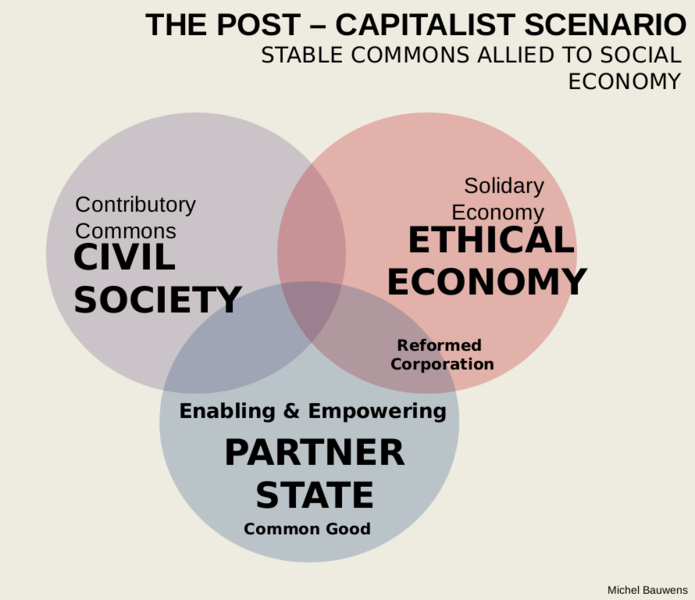Ecuador's FLOK Society, a university-based research partnership aiming to disrupt the prevailing economic model by helping to facilitate the evolution of the sharing economy, has a manifesto of sorts, "The Transition to a Commons-based Society," and is now seeking public comment on the document.
The policies seek to advance Ecuador's national "Plan of Good Living," which is underpinned by the government's desire to embrace and advance open knowledge and sharing. FLOK, which stands for "free," "libre," and "open knowledge," operates in concert with Ecuador's national government to research policies that can advance Ecuador toward a commons-based society. Michel Bauwens, founder of the P2P Foundation, serves as research director for the project.Shareable interviewed members of the organization back in 2013.
The document outlines the limitations of the traditional model of cognitive capitalism and describes the three emerging models now underway: first, "classic" cognitive capitalism (essentially the traditional model in the pre-network era), second, "hierarchical capitalism" (the era that now predominates, in which the front-end of the emerging sharing economy is controlled by a few actors on the back-end (Google, facebook, etc.), and third, the emerging mature, civic, p2p economy, which is truly decentralized and redistributes value fairly to those who contribute.
The paper proposes the state act as a"Partner State" to facilitate the emergence of the third model through supporting development of civic infrastructure and encouraging transition from extractive to generative ownership models. Doing so will help to speed innovation, the paper argues, whereas privatization and commodification of knowledge slows it while also concentrates value to a few, while the many are required to pay for access to that vaue.
The document also proposes replacing "non-reciprocal 'communistic' licenses, with socialist licenses, i.e.based on the requirement of reciprocity." Those who contribute and participate in the peer-to-peer commons will derive beneft proportionally under such a scheme.
The document also outlines four potential technological regimes underlying these three models on 3 axes of profit to benefit, local to global, and decentralized to distributed. these are netarchical capitalism (e.g. Facebook; for-profit, centralized, global), distributed capitalism (e.g. Bitcoin for-profit, decentralized, local), Local Resilience (e.g. Transition Town; for-benefit, decentralized, local), and Global Commons (e.g. global, decentralized, for-benefit).
Finally, the paper concludes that a successful transition will depend on the formation and successful operation of three institutions: a civic "Alliance of the Commons," which faciliattes collaboration between peer networks, a "Chamber of the Commons," (analagous to the Chamber of Commerce) which connects with government and exercises political power, and "phyles:" defined as "a coalition of commons-oriented, community-supportive ethical enterprises which trade and exchange in the market to create livelihoods for commoners and peer producers engaged in social production." Phyles are necesary to establish power outside of the nation-state.
You can view the full The Transition to a Commons-based Society document to provide your comment.









